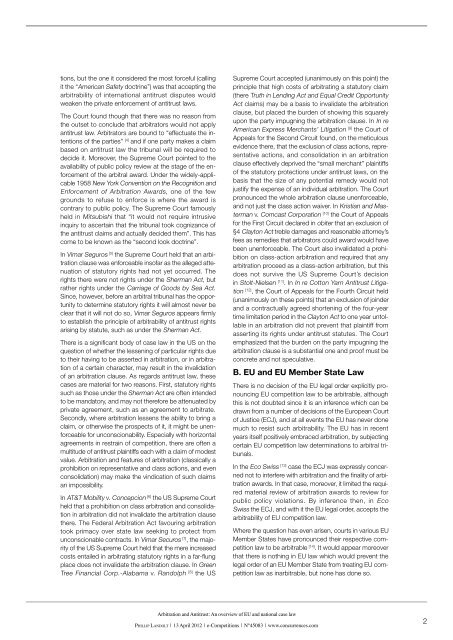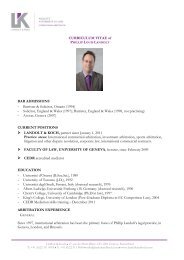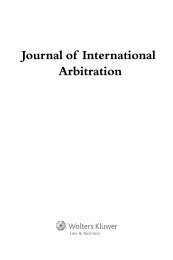Arbitration and Antitrust An overview of EU and national case law
Arbitration and Antitrust: An overview of EU and ... - Landolt & Koch
Arbitration and Antitrust: An overview of EU and ... - Landolt & Koch
- No tags were found...
Create successful ePaper yourself
Turn your PDF publications into a flip-book with our unique Google optimized e-Paper software.
tions, but the one it considered the most forceful (calling<br />
it the “American Safety doctrine”) was that accepting the<br />
arbitrability <strong>of</strong> inter<strong>national</strong> antitrust disputes would<br />
weaken the private enforcement <strong>of</strong> antitrust <strong>law</strong>s.<br />
The Court found though that there was no reason from<br />
the outset to conclude that arbitrators would not apply<br />
antitrust <strong>law</strong>. Arbitrators are bound to “effectuate the intentions<br />
<strong>of</strong> the parties” [4] <strong>and</strong> if one party makes a claim<br />
based on antitrust <strong>law</strong> the tribunal will be required to<br />
decide it. Moreover, the Supreme Court pointed to the<br />
availability <strong>of</strong> public policy review at the stage <strong>of</strong> the enforcement<br />
<strong>of</strong> the arbitral award. Under the widely-applicable<br />
1958 New York Convention on the Recognition <strong>and</strong><br />
Enforcement <strong>of</strong> <strong>Arbitration</strong> Awards, one <strong>of</strong> the few<br />
grounds to refuse to enforce is where the award is<br />
contrary to public policy. The Supreme Court famously<br />
held in Mitsubishi that “it would not require intrusive<br />
inquiry to ascertain that the tribunal took cognizance <strong>of</strong><br />
the antitrust claims <strong>and</strong> actually decided them”. This has<br />
come to be known as the “second look doctrine”.<br />
In Vimar Seguros [5] the Supreme Court held that an arbitration<br />
clause was enforceable ins<strong>of</strong>ar as the alleged attenuation<br />
<strong>of</strong> statutory rights had not yet occurred. The<br />
rights there were not rights under the Sherman Act, but<br />
rather rights under the Carriage <strong>of</strong> Goods by Sea Act.<br />
Since, however, before an arbitral tribunal has the opportunity<br />
to determine statutory rights it will almost never be<br />
clear that it will not do so, Vimar Seguros appears firmly<br />
to establish the principle <strong>of</strong> arbitrability <strong>of</strong> antitrust rights<br />
arising by statute, such as under the Sherman Act.<br />
There is a significant body <strong>of</strong> <strong>case</strong> <strong>law</strong> in the US on the<br />
question <strong>of</strong> whether the lessening <strong>of</strong> particular rights due<br />
to their having to be asserted in arbitration, or in arbitration<br />
<strong>of</strong> a certain character, may result in the invalidation<br />
<strong>of</strong> an arbitration clause. As regards antitrust <strong>law</strong>, these<br />
<strong>case</strong>s are material for two reasons. First, statutory rights<br />
such as those under the Sherman Act are <strong>of</strong>ten intended<br />
to be m<strong>and</strong>atory, <strong>and</strong> may not therefore be attenuated by<br />
private agreement, such as an agreement to arbitrate.<br />
Secondly, where arbitration lessens the ability to bring a<br />
claim, or otherwise the prospects <strong>of</strong> it, it might be unenforceable<br />
for unconscionability. Especially with horizontal<br />
agreements in restrain <strong>of</strong> competition, there are <strong>of</strong>ten a<br />
multitude <strong>of</strong> antitrust plaintiffs each with a claim <strong>of</strong> modest<br />
value. <strong>Arbitration</strong> <strong>and</strong> features <strong>of</strong> arbitration (classically a<br />
prohibition on representative <strong>and</strong> class actions, <strong>and</strong> even<br />
consolidation) may make the vindication <strong>of</strong> such claims<br />
an impossibility.<br />
In AT&T Mobility v. Concepcion [6] the US Supreme Court<br />
held that a prohibition on class arbitration <strong>and</strong> consolidation<br />
in arbitration did not invalidate the arbitration clause<br />
there. The Federal <strong>Arbitration</strong> Act favouring arbitration<br />
took primacy over state <strong>law</strong> seeking to protect from<br />
unconscionable contracts. In Vimar Securos [7] , the majority<br />
<strong>of</strong> the US Supreme Court held that the mere increased<br />
costs entailed in arbitrating statutory rights in a far-flung<br />
place does not invalidate the arbitration clause. In Green<br />
Tree Financial Corp.-Alabama v. R<strong>and</strong>olph [8] the US<br />
Supreme Court accepted (unanimously on this point) the<br />
principle that high costs <strong>of</strong> arbitrating a statutory claim<br />
(there Truth in Lending Act <strong>and</strong> Equal Credit Opportunity<br />
Act claims) may be a basis to invalidate the arbitration<br />
clause, but placed the burden <strong>of</strong> showing this squarely<br />
upon the party impugning the arbitration clause. In In re<br />
American Express Merchants’ Litigation [9] the Court <strong>of</strong><br />
Appeals for the Second Circuit found, on the meticulous<br />
evidence there, that the exclusion <strong>of</strong> class actions, representative<br />
actions, <strong>and</strong> consolidation in an arbitration<br />
clause effectively deprived the “small merchant” plaintiffs<br />
<strong>of</strong> the statutory protections under antitrust <strong>law</strong>s, on the<br />
basis that the size <strong>of</strong> any potential remedy would not<br />
justify the expense <strong>of</strong> an individual arbitration. The Court<br />
pronounced the whole arbitration clause unenforceable,<br />
<strong>and</strong> not just the class action waiver. In Kristian <strong>and</strong> Masterman<br />
v. Comcast Corporation [10] the Court <strong>of</strong> Appeals<br />
for the First Circuit declared in obiter that an exclusion <strong>of</strong><br />
§4 Clayton Act treble damages <strong>and</strong> reasonable attorney’s<br />
fees as remedies that arbitrators could award would have<br />
been unenforceable. The Court also invalidated a prohibition<br />
on class-action arbitration <strong>and</strong> required that any<br />
arbitration proceed as a class-action arbitration, but this<br />
does not survive the US Supreme Court’s decision<br />
in Stolt-Nielsen [11] . In In re Cotton Yarn <strong><strong>An</strong>titrust</strong> Litigation<br />
[12] , the Court <strong>of</strong> Appeals for the Fourth Circuit held<br />
(unanimously on these points) that an exclusion <strong>of</strong> joinder<br />
<strong>and</strong> a contractually agreed shortening <strong>of</strong> the four-year<br />
time limitation period in the Clayton Act to one year untollable<br />
in an arbitration did not prevent that plaintiff from<br />
asserting its rights under antitrust statutes. The Court<br />
emphasized that the burden on the party impugning the<br />
arbitration clause is a substantial one <strong>and</strong> pro<strong>of</strong> must be<br />
concrete <strong>and</strong> not speculative.<br />
B. <strong>EU</strong> <strong>and</strong> <strong>EU</strong> Member State Law<br />
There is no decision <strong>of</strong> the <strong>EU</strong> legal order explicitly pronouncing<br />
<strong>EU</strong> competition <strong>law</strong> to be arbitrable, although<br />
this is not doubted since it is an inference which can be<br />
drawn from a number <strong>of</strong> decisions <strong>of</strong> the European Court<br />
<strong>of</strong> Justice (ECJ), <strong>and</strong> at all events the <strong>EU</strong> has never done<br />
much to resist such arbitrability. The <strong>EU</strong> has in recent<br />
years itself positively embraced arbitration, by subjecting<br />
certain <strong>EU</strong> competition <strong>law</strong> determinations to arbitral tribunals.<br />
In the Eco Swiss [13] <strong>case</strong> the ECJ was expressly concerned<br />
not to interfere with arbitration <strong>and</strong> the finality <strong>of</strong> arbitration<br />
awards. In that <strong>case</strong>, moreover, it limited the required<br />
material review <strong>of</strong> arbitration awards to review for<br />
public policy violations. By inference then, in Eco<br />
Swiss the ECJ, <strong>and</strong> with it the <strong>EU</strong> legal order, accepts the<br />
arbitrability <strong>of</strong> <strong>EU</strong> competition <strong>law</strong>.<br />
Where the question has even arisen, courts in various <strong>EU</strong><br />
Member States have pronounced their respective competition<br />
<strong>law</strong> to be arbitrable [14] . It would appear moreover<br />
that there is nothing in <strong>EU</strong> <strong>law</strong> which would prevent the<br />
legal order <strong>of</strong> an <strong>EU</strong> Member State from treating <strong>EU</strong> competition<br />
<strong>law</strong> as inarbitrable, but none has done so.<br />
<strong>Arbitration</strong> <strong>and</strong> <strong><strong>An</strong>titrust</strong>: <strong>An</strong> <strong>overview</strong> <strong>of</strong> <strong>EU</strong> <strong>and</strong> <strong>national</strong> <strong>case</strong> <strong>law</strong><br />
PHILLIP LANDOLT l 13 April 2012 l e-Competitions l N°45083 l www.concurrences.com<br />
2





